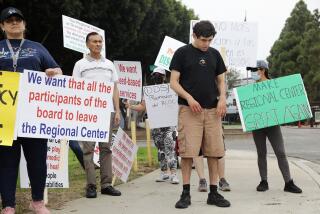Elder Care System Not Ready for ‘Orphans’
- Share via
MIAMI — An estimated 3% of America’s older population have been called the “sheltered generation,” mentally retarded senior citizens who outlive their parents.
“We’re not prepared,” said John Stokesbury, director of the University of Miami’s Center on Aging and Developmental Disabilities. “The professional and social service community is not prepared to suddenly deal with someone who is orphaned at age 60.”
Long before the 1960s push for special education, parents chose whether to send their children to an insane asylum or keep them home. Many families who kept their children at home dealt little with the social service system and haven’t planned for their own deaths.
In Florida, social service agencies are aware of 1,500 adults with any of about 200 lifelong developmental disabilities, ranging from Down’s syndrome to autism to cerebral palsy. But some social service workers believe that the actual population is closer to 15,000.
“Many of these parents realize there’s a problem. They never thought their child would outlive them,” said Stokesbury, a state social service worker and administrator for 18 years. “The doctors said their children wouldn’t live past their teens. But they did.”
Many developmentally disabled people are susceptible to respiratory diseases, but antibiotics virtually eliminated pneumonia as a fatal illness. Congenital heart problems were repaired with surgery. Life spans were stretched.
An increasing focus on the aging of American society drew attention to this overlooked group and pushed federal agencies for the aging and developmentally disabled last year to jointly fund research work for the first time.
At the University of Miami’s medical school, the center is trying to identify the “sheltered generation” born from the 1920s to 1940s, develop an advocacy program and train professionals to deal with them.
The center is asking home meal delivery groups, churches, physicians and others with direct family contact to help.
Parents can be briefed on guardianship and financial planning to ease their children through the emotional crisis of their deaths.
More to Read
Sign up for Essential California
The most important California stories and recommendations in your inbox every morning.
You may occasionally receive promotional content from the Los Angeles Times.










